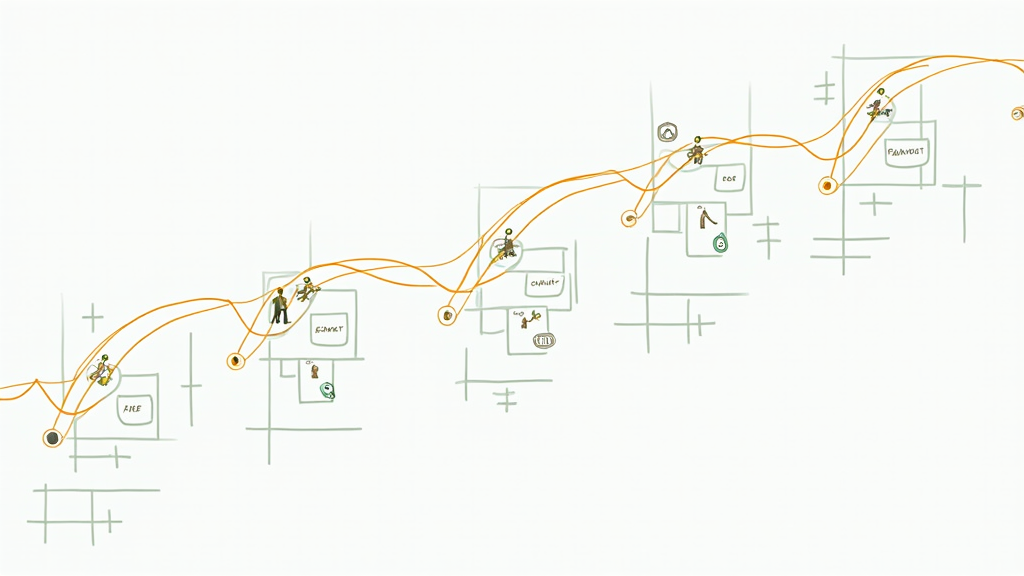Hike Smarter from Day One: Avoid the Pitfalls That Trip Up Newcomers
Starting a new adventure can be exciting, but beginners often stumble over common pitfalls that slow progress. In this article, I share my perspective on the top beginner mistakes and provide guidance on how to avoid them. From planning missteps to neglecting self-reflection, small errors can lead to larger setbacks if they aren’t addressed early.
Table of Contents
The Road to Success
Common Beginner Mistakes
Start Right With Practical Planning
A Closer Look at Specific Pitfalls
Poor Planning and Goal Setting
Overloading on Tools and Techniques
Neglecting Reflection and Feedback
Failure to Adapt
Embracing a Growth Mindset
Practical Strategies for Avoiding Common Pitfalls
Frequently Asked Questions
Wrapping It Up
Extra Advice for Sustained Success

The Road to Success
When I first kicked things off on a new endeavor, I quickly discovered that many early mistakes can be easily sidestepped with better planning and a realistic mindset. Joining any new activity requires understanding that mistakes are part of the learning curve. This article lays out some pitfalls I have encountered and observed, along with practical strategies to avoid them. Recognizing and overcoming these common mistakes can help pave the way for smoother progress and build confidence for tackling future challenges.
Common Beginner Mistakes
There are several pitfalls that many newcomers tend to encounter. Often, these mistakes come from a mix of overexcitement, lack of planning, and sometimes misinterpreting feedback. I have seen many beginners rush into new activities without fully understanding what lies ahead, leading to missteps that delay progress.
Below are some frequent errors I’ve noticed:
- Skipping the Research: Jumping into an activity without doing enough background research can lead to picking the wrong tools or techniques.
- Overcomplicating the Process: Beginners sometimes try to use advanced methods before mastering the basics, which can make the learning process overwhelming.
- Neglecting a Solid Plan: Entering a new field without setting clear goals often results in wasted time and effort, as the path isn’t well defined.
- Ignoring Feedback: Not being open to constructive criticism can limit growth and result in repeating the same mistakes.
- Underestimating Time Requirements: Many beginners misjudge how much time and effort is needed to achieve proficiency, leading to frustration and burnout.
Each of these mistakes can lower confidence and create a cycle of discouragement if no steps are taken to ease up on them.
Start Right With Practical Planning
I learned early on that setting a clear plan is one of the best ways to avoid early pitfalls. Effective planning means not just mapping out your tasks, but also creating realistic goals and allowing room for adjustments as you learn more about your new activity. Here are some practical suggestions that have worked for me:
- Define Small, Achievable Goals: Break your larger objectives into smaller, manageable targets. This can make the process less daunting and provide a clear sense of accomplishment along the way.
- Research Thoroughly: Spending time on research initially may seem slow, but it saves a lot of time later on by helping you avoid ill-informed decisions.
- Prioritize Fundamentals Over Fancy Techniques: Stick with the basics until you feel comfortable. It’s very important to build a strong foundation before trying advanced strategies.
- Schedule Regular Reviews: Getting into the habit of reviewing your progress helps you catch missteps early, allowing you to modify your approach as needed.
- Establish a Routine: Consistency is very helpful. Setting aside specific times for practice and study creates momentum and keeps you on track for steady improvement.
Taking these steps not only reduces the risk of repeating beginner mistakes but also builds the discipline needed for mastering more advanced concepts later on.

A Closer Look at Specific Pitfalls
Let’s jump into detail on some key mistakes that beginners tend to make, along with ways to avoid them.
Poor Planning and Goal Setting
One of the most common mistakes is jumping in without a clear plan. I once found myself overwhelmed with too many ideas but not enough structure. This lack of planning led to wasted efforts and frustration. Creating a detailed roadmap with realistic milestones helps keep priorities clear. I recommend jotting down your goals and the steps you need to meet them. Revisiting and adjusting these plans regularly can really make a difference.
Overloading on Tools and Techniques
Newcomers often feel the need to adopt every available tool, software, or method that promises quick results. Overcomplicating the process by using too many tools can create more confusion than clarity. I realized that sticking with one or two trusted approaches until I mastered them was more beneficial. Over time, as I grew more comfortable with the essentials, gradually integrating more advanced techniques became a natural progression.
Neglecting Reflection and Feedback
Another pitfall is not taking the time to reflect on one’s progress or listening to feedback. I’ve seen many beginners repeat the same errors because they did not critically assess their work. Reflecting on what went wrong and seeking advice from experienced peers helps correct these mistakes. Make it a habit to ask for critiques and take time to analyze your own methods. This drive for improvement can accelerate your learning curve.
Failure to Adapt
The inability to adjust when things don’t go as planned is another common misstep. I remember trying to force a particular strategy that wasn’t working out simply because I was too invested in it. While it can be tempting to stick with a familiar approach, flexibility is key. Sometimes, it pays to step back and re-evaluate your strategy. Being adaptive and open to change helps turn setbacks into learning opportunities.
Each of these pitfalls can be overcome by thoughtful reflection and maintaining a structured approach to your learning adventure. Don’t be afraid to adjust your methods as you gain more experience and insights.

Embracing a Growth Mindset
One of the best pieces of advice I have found is to cultivate a growth mindset. Embracing the idea that every challenge is a chance to learn has a lasting impact on your adventure. Instead of viewing mistakes as failures, I consider them part of the process. This perspective helps reduce the fear of failure and encourages experimenting with new approaches.
Here are a few reminders for nurturing a growth mindset:
- View Mistakes as Learning Opportunities: Every misstep gives you a chance to understand what works and what doesn’t. Celebrate the insight rather than the misstep itself.
- Stay Curious: Keep an open attitude and continuously seek to learn new techniques or perspectives that can enrich your understanding.
- Ask Questions: Don’t hesitate to check in with mentors or peers when you need clarity. This not only speeds up your learning but also builds a supportive community.
- Practice Patience: Skills take time to develop. Recognizing that progress may be slow at first can help you remain patient and persistent.
This mindset shift has proven incredibly helpful in making mistakes a stepping stone towards success rather than a source of discouragement.
Practical Strategies for Avoiding Common Pitfalls
Over the years, I have learned that certain strategies help in reducing the frequency and impact of beginner mistakes. These strategies can be applied regardless of the field or interest area.
- Invest Time in Research: Before beginning, take the time to learn as much as possible about your chosen area. This helps in setting realistic expectations and avoiding surprises.
- Create a Structured Learning Path: Having a step-by-step guide or curriculum keeps your efforts aligned and organized. It’s easier to see progress when tasks are broken down into small parts.
- Build a Support Network: Whether it’s joining online forums, local groups, or study circles, being part of a community helps you learn from others’ experiences. Engaging with a supportive group makes it easier to recognize and avoid common mistakes.
- Review and Reflect Often: Make regular reviews a part of your process. I find that taking a few minutes at the end of each session to note what went well and what could be improved sets a positive cycle of growth.
- Practice With Purpose: Rather than just practicing to practice, focus on specific areas that need improvement. Purposeful practice accelerates improvement and makes learning more enjoyable.
These strategies, though simple, can have a profound effect on your learning adventure. They help in setting the stage for continuous improvement and long-term success.

Frequently Asked Questions
Below are some common questions I often hear from beginners, along with my answers based on personal experience:
Question: What is the most common beginner mistake?
Answer: Many beginners jump into an activity without proper research or planning. Taking the time to understand the basics and setting realistic goals from the start can prevent many issues later on.
Question: How can I learn from my early mistakes?
Answer: The best way to learn is to regularly review your progress and openly accept feedback. Keeping a journal of your experiences can help you identify recurring problems and find effective solutions.
Question: What tips can help overcome the fear of failure?
Answer: Embrace each mistake as a lesson. Ask questions, be patient with yourself, and remember that every expert was once a beginner. Maintaining a growth mindset helps you see failure as a stepping stone rather than a setback.
Wrapping It Up
As you navigate your way through new challenges, be mindful of common beginner mistakes. By planning well, staying patient, and being open to feedback, you set yourself up for a smoother adventure. Each small step in learning builds confidence and opens up new opportunities for growth.
I have found that the key is not to rush but to build a solid foundation. With thoughtful planning, a consistent approach, and a willingness to adjust, it becomes easier to dodge the pitfalls that hinder progress. Every mistake is just another chance to learn and improve.
The adventure may seem long, especially when facing hurdles early on. However, by recognizing potential pitfalls ahead of time, you can work on avoiding them and on making adjustments that will benefit you immensely in the long run. I invite you to take these suggestions into your routine and see how far you can go as you steadily build expertise without falling prey to common beginner errors.
Remember, every learning process is unique. Stay focused, be prepared to make adjustments, and trust that with persistence, the skills you gain will soon lead to meaningful success. Enjoy the adventure and keep pushing forward.
Extra Advice for Sustained Success
When you build a strong foundation, it is really important to not only rely on routine strategies but also to explore additional creative approaches for achieving sustainable growth. A fundamental aspect is to consistently evaluate your progress and seek out new methods that fit your evolving skills. In my experience, taking a step back periodically to reflect on the big picture gives you the opportunity to mix things up and sometimes uncover hidden challenges before they become obstacles. Embrace every piece of feedback as a gift; even criticism can provide insights if you approach it with an open mind. In addition, setting aside time for self-evaluation has helped me gauge my progress and adjust my plans accordingly.
Experimenting with different learning formats and mediums such as interactive workshops, online webinars, or community groups can inject a refreshing dynamic into your study routine. It is really important to remember that no single strategy works for everyone. Try different techniques, such as pairing up with a study buddy or joining discussions in online communities. With every new idea and experience, you build not only your skill set, but also a network of support that pushes you to become better every day.
Another key point is to maintain a balance between ambition and self-care. It can be tempting to push yourself to the limit when you are passionate, but burning out is all too common among beginners. Ensure that you allocate sufficient time for relaxation and hobbies that help recharge your mind and body. Progress in any endeavor is a steady climb, and every step forward, no matter how small, is a victory in itself. Keep aiming for improvement, stay consistent, and let each experience be a building block for long-term success. Over time, these small, incremental advancements add up to major achievements, reinforcing the value of perseverance and a well-thought-out plan.

